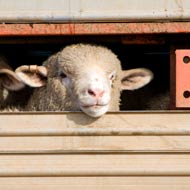Government considering controls on live animal exports

The government is considering options to control live exports after Brexit.
The government is considering options to control exports of live animals after Britain leaves the European Union.
According to Farmer's Weekly, Defra minister Therese Coffey confirmed ministers were looking into the issue during a Westminster Hall debate on Tuesday (12 December).
She is reported to have told parliament that the live export trade remained “a considerable concern” despite a huge fall in recent years.
“We have always been clear that the government would prefer to see animals slaughtered as near as possible to their point of production,” she said. “We believe that a trade in meat is preferable to a trade based on the transport of live animals, particularly when journeys may result in livestock travelling long distances across Europe.”
She added that live exports were restricted by the EU, but Brexit was a “unique opportunity to shape future animal welfare policy to ensure the highest standards in every area”.
She continued: “Our manifesto commitment made it clear that we would take early steps to control the export of live farm animals for slaughter once we leave the EU.
“We are currently considering options, but the issue is rather complex and any future proposals would have to consider trade between the UK and Ireland, whether that is with Northern Ireland or across the Republic of Ireland.”



 The Federation of Independent Veterinary Practices (FIVP) has announced a third season of its podcast, Practice Matters.
The Federation of Independent Veterinary Practices (FIVP) has announced a third season of its podcast, Practice Matters.